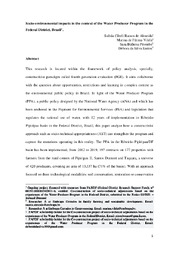Socio-environmental impacts in the context of the Water Producer Program in the Federal District, Brazil.
Socio-environmental impacts in the context of the Water Producer Program in the Federal District, Brazil.
Author(s): ALMEIDA, S. C. R. de; VILELA, M. de F.; PITOMBO, S.; SANTOS, D.
Summary: This research is located within the framework of policy analysis, specially, constructivist paradigm called fourth generation evaluation (FGE). It aims collaborate with the question about opportunities, restrictions and learning in complex context as the environmental public policy in Brazil. In light of the Water Producer Program (PPA), a public policy designed by the National Water Agency (ANA) and which has been anchored in the Payment for Environmental Services (PSA) and legislation that regulates the rational use of water, with 12 years of implementation in Ribeirão Pipiripau basin in the Federal District, Brazil, this paper analyze how a constructivist approach such as socio-technical appropriateness (AST) can strengthen the program and capture the mutations operating in this reality. The PPA in the Ribeirão Pipiripau/DF basin has been implemented, from 2012 to 2019, 197 contracts on 177 properties with farmers from the rural centers of Pipiripau II, Santos Dumont and Taquara, a universe of 420 producers, covering an area of 13,337 ha (71% of the basin). With an approach focused on three technological modalities: soil conservation; restoration or conservation of Permanent Protection Areas and/or Legal Reserves and conservation of remnants of native vegetation, the project intends to universalize actions in a diverse and complex context both from the point of view of the socioeconomic profile of farmers and the activities carried out on the properties, as well as conflicts generated with the surrounding urban population. The Federal District currently ranks third in the ranking of the most populous cities in the country. The field research involved approximately one hundred producers, participants in the program, in the three rural centers involved, with the aim of capturing the learning of this public policy by the main actors involved in the process, the farmers. It has taken place from March 2023 to January 2024, covering the impacts of the post-pandemic, economic and climate crises. Semi-structured methodological instruments were used considering the research context. Several transformations were recorded in the period in question, including: in the main crops practiced in the basin, in regulations on land use and water. It is essential to incorporate farmers' perceptions of these processes. In that regard, the AST approach advocates participation, collective construction for and by farmers themselves, which strengthens the process and commits the actors involved, especially those who are directly involved in the daily life of water-producing environments. In this sense, the choice of a theoretical-methodological approach to construction and implementation that allows monitoring and feedback must guide and feed public policies.
Publication year: 2024
Types of publication: Paper in annals and proceedings
Unit: Embrapa Cerrados
Observation
Some of Embrapa's publications are published as ePub files. To read them, use or download one of the following free software options to your computer or mobile device. Android: Google Play Books; IOS: iBooks; Windows and Linux: Calibre.
Access other publications
Access the Agricultural Research Database (BDPA) to consult Embrapa's full library collection and records.
Visit Embrapa Bookstore to purchase books and other publications sold by Embrapa.

